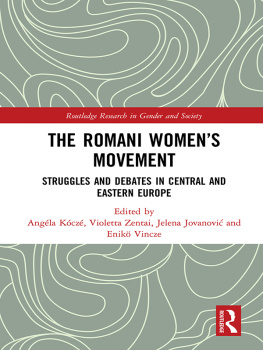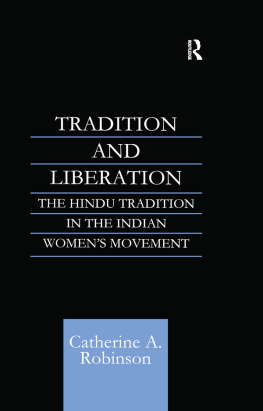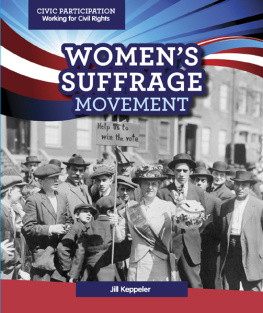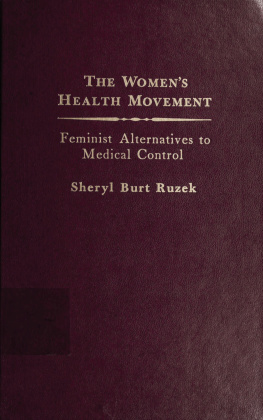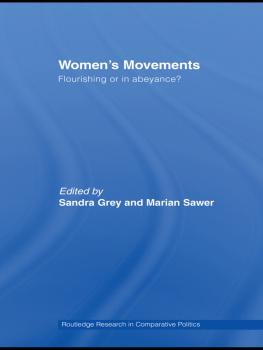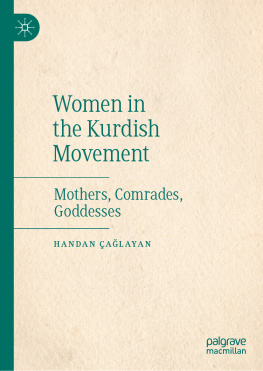ROUTLEDGE LIBRARY EDITIONS:
FEMINIST THEORY
FEMINIST EXPERIENCES
FEMINIST EXPERIENCES
The Women's Movement in Four Cultures
SUSAN BASSNETT
Volume 11
First published in 1986
This edition first published in 2013
by Routledge
2 Park Square, Milton Park, Abingdon, Oxon, OX14 4RN
Simultaneously published in the USA and Canada
by Routledge
711 Third Avenue, New York, NY 10017
Routledge is an imprint of the Taylor & Francis Group, an informa business
1986 S. Bassnett
All rights reserved. No part of this book may be reprinted or reproduced or utilised in any form or by any electronic, mechanical, or other means, now known or hereafter invented, including photocopying and recording, or in any information storage or retrieval system, without permission in writing from the publishers.
Trademark notice: Product or corporate names may be trademarks or registered trademarks, and are used only for identification and explanation without intent to infringe.
British Library Cataloguing in Publication Data
A catalogue record for this book is available from the British Library
ISBN: 978-0-415-53401-7 (Set)
eISBN: 978-0-203-08796-1 (Set)
ISBN: 978-0-415-63676-6 (Volume 11)
eISBN: 978-0-203-08504-2 (Volume 11)
Publisher's Note
The publisher has gone to great lengths to ensure the quality of this reprint but points out that some imperfections in the original copies may be apparent.
Disclaimer
The publisher has made every effort to trace copyright holders and would welcome correspondence from those they have been unable to trace.
FEMINIST
EXPERIENCES
The Women's Movement
in Four Cultures
SUSAN BASSNETT
London
ALLEN & UNWIN
BostonSydney
S. Bassnett, 1986
This book is copyright under the Berne Convention.
No reproduction without permission. All rights reserved.
Allen & Unwin (Publishers) Ltd,
40 Museum Street, London WC1A 1LU, UK
Allen & Unwin (Publishers) Ltd,
Park Lane, Hemel Hempstead, Herts HP2 4TE, UK
Allen & Unwin, Inc.,
8 Winchester Place, Winchester, Mass. 01890, USA
Allen & Unwin (Australia) Ltd,
8 Napier Street, North Sydney, NSW 2060, Australia
First published in 1986
British Library Cataloguing in Publication Data
Bassnett, Susan
Feminist experiences: the women's movement
in four cultures.
1. Feminism
I. Title
305.4'2 HQ1122
ISBN 0043012736
ISBN 0043012744 Pbk
Library of Congress Cataloging-in-Publication Data
Bassnett, Susan.
Feminist experiences.
Bibliography: p.
Includes index.
1. Feminism - Cross-cultural studies. 2. Feminism -
United States - History 19th century. 3. Feminism -
Germany (East) - History - 19th century. 4. Feminism -
Italy - History 19th century. 5. Feminism - Great
Britain - History 19th century. I. Title.
HQ1154.B324 1986 305.4'2 8610908
ISBN 0043012736 (U.S.: alk. paper)
ISBN 0043012744 (U.S.. pbk.: alk. paper)
Set in 11 on 12 point Garamond by Nene Phototypesetters Ltd
and printed in Great Britain by Billings and Sons Ltd, London and Worcester
For my mother and my daughter
Contents
Acknowledgements
Many people have helped in the preparation and writing of this book. I owe particular thanks to Farrell Burnett, also to Vita Fortunati, Giovanna Franci and the staff of the Librellula in Bologna. My thanks also to Stefanie Liedtke from Panorama DDR, who took such pains to help me with the research in the GDR. I am grateful to Irene Pearson, who typed the manuscript, and, as ever, thanks are due to Stella Dixon and to my mother, husband and daughters Lucy and Vanessa, without whom I should not have had the time or space in which to write at all.
Introduction
The women's movement is usually referred to as if it were a constant, global phenomenon. There are women's movements in Europe, North and South America, Africa, the Middle East, India, Japan and Australia, and there is an assumption in the minds of men and women alike that the movements are regional developments of the same thing, sharing a common core. But anyone who is familiar with more than one culture soon becomes aware not so much of similarities as of differences between women's movements, of variations in emphasis, in priorities, in tactics and in aims. As someone who has no definitive roots in any one culture, I have been able to consider some of those differences in four societies without being prejudiced in favour of any one of them, and through the process of comparing I have asked myself the question whether there is any universal trans-cultural feminist thought and aspiration, or whether the demands of women in any context are conditioned by the history of men and women in that society.
I have gone back beyond the recent resurgence of feminism that has come to be termed the women's movement and looked at the history of feminism in the nineteenth century. In so doing, I have had to reappraise the very term feminism. Since its first appearance in the eighteenth century there have been two main lines of development liberal feminism, of the kind that flourished in the United States, and revolutionary or socialist feminism. In examining the four societies in this book I have traced those two often conflicting lines through the stages of their development within their national contexts as part of an attempt to explain the differences in concepts of feminism today. So, for example, in Britain and the United States, the prevailing tradition has been that of liberal feminism, sometimes described in denigratory terms as bourgeois feminism, which reflects the consistency in the processes of democratic government in both countries. In Italy, on the contrary, liberal feminism has played little part in the rebirth of feminism in the late 1960s, but then Italy has undergone radical changes in the past century alone, moving from a nation of small ducalities to unification in 1870, then through a period of fascist rule, a war of occupation, a civil war and the subsequent rise in the postwar period of the largest communist party outside eastern Europe. The energy of the Italian women's movement reflects the violent changes that have swept through Italian society.
Equally, the emergence of what can be described as feminism in the German Democratic Republic (GDR) derives from the particular history of the new postwar Germany. While Western feminists wrestle with what Heidi Hartmann has called the unhappy marriage of Marxism and feminism, women in the GDR have considered the woman question from a totally different perspective, from within socialism rather than from outside. The fundamental debate on the nature of patriarchy still goes on, but East German women are bound to see the terms of that debate very differently.
My analysis of the differences between the four societies is the basis of this book. I have focused on the violence of the Italian women's movement, on its intellectualism, on its energy. In analysing the American women's movement I have dwelt on its roots in the past and on what seem to be its inherent contradictions, due to a belief in pragmatic solutions. Discussing the GDR I have tried to show how a sense of feminism on a completely new basis is emerging through other means than those of the organized women's movements elsewhere, and have found myself looking at the problem of the relationship between Marxism and feminism with new eyes. The greatest problems have been presented by my attempts to look at the women's movement in Britain, because try as I might, I found myself continually returning not so much to problems of feminism as to problems of class. The mysteries of the British class system pervade every aspect of British life, and the women's movement is not exempt.



